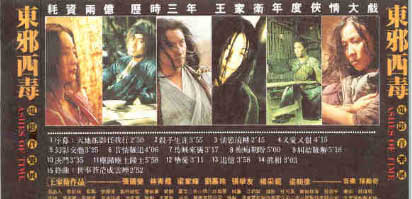

Wong Kar-Wai has created a film that is structured in such an elliptical way that it needs more than one viewing to understand the plot and the characters. The first time I watched this film I nearly shut it off after twenty minutes because I felt so confused and so disconnected with what was happening on the screen. Then slowly it pulled me in and I found it fascinating and powerful. The tone of sadness and dislocation that permeate the film seeps into your bones like an autumn chill. In some ways the film could be accused of catching a case of self importance in it’s heavy philosophical tone, use of inner narrative and the near fetish for beauty, but it creates such a multi-textured tapestry of images and music that I don’t care.
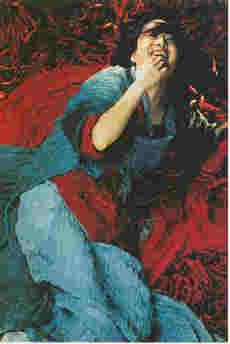
Leslie Cheung as Ouyang Feng exiles himself to the desert where he sets up shop as an agent for swordsmen for hire. This self imposed exile is because his lover, Maggie Cheung, has tired of waiting for him and married his older brother. The film revolves around characters that come to him for one reason or another and the film follows them in vignette fashion for a while until they disappear from the story. Like the desert though all traces of them disappear with the wind.
The first story involves Murong who asks him to kill Huang Yaoshi (Tony Leung Kar Fai) Ouyang’s oldest friend because he stood up his sister. Then the sister comes and asks Ouyang to kill her brother because he will not give her the freedom she needs. It is the same person – Yin and Yang - played with great presence by whom else but Brigitte Lin.
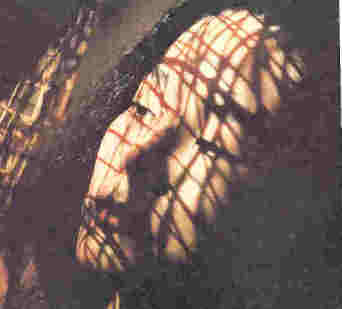
The action scenes were put together by Sammo, but WKW utilizes a method of quick cutting and blurring the picture to create a startling canvass of images. In most films where this has been copied and used, I have found it very annoying, but here it captures the mood of the film perfectly.
In the last episode, another young killer, Jackie Cheung, shows up looking for work. To show that he still has some humanity left inside he accepts a killing job for one egg from Charlie Yeung.
Finally in the last few minutes of the film – the scene shifts to Maggie talking to Huang Yaoshi and telling him in a monologue of her undying love for Ouyang. The camera stays on her face in close-up for about two minutes and it is perhaps two of the most ravishing minutes in film history. Her beauty and sadness punch a hole in your stomach.
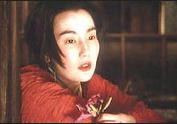
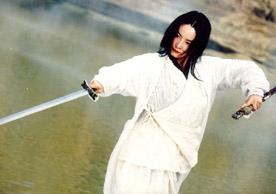
For what seemed like the longest time, I was afraid to check out this film. Quite a few Hong Kong movie fans seemed to hate it so (I particularly recall a description of it as ""Dragon Inn" minus cool plus suck"!). And those who thought highly of it warned that it needed more than one viewing to appreciate. Even one of its actors (the puzzlingly unbilled Maggie Cheung) admitted that she only understood it on her second viewing of it. Ultimately though, I just could not resist a movie which starred four of my favorite actresses (Brigitte Lin Ching-Hsia, Maggie Cheung, Charlie Yeung and Carina Lau) along with Leslie Cheung, Tony Leung Chiu Wai, Tony Leung Kar Fai and Jackie Cheung.
The first time I watched what has been described as "a philosopher's movie" (by a New York Times film critic?), I expected to be confused and irritated...but did not expect to feel emotionally gripped by the movie (in large part because of its alternately grand, soulful and sensual -- yet always amazingly appropriate -- music) and THAT aesthetically blown away by its largely visionary visuals. The second time around (a mere two days later), I must admit to somewhat anally arming myself with a pen and sheet of paper, and proceeding to chart out the relations between the different characters in the movie...an action which definitely helped me to sort out the characters (a few of whom had looked quite alike to me) as well as figure out how one had impacted the life of another or others.
The third time (one day after!) that I watched ASHES OF TIME, I saw still more that allowed me to understand not only the actions but also the feelings and outlooks of each now eminently distinctive character. The fourth time (a couple of weeks later), I approached it less as an interesting puzzle than as an emotional experience, and found the film extremely fulfilling to deal with in this way. The fifth time (one week on), I watched the film in segmented parts, and found that individual sections could successfully stand alone to be appreciated. The sixth time (two days prior to writing this review), I found that I was much more able to excuse -- and laugh at -- the things which had initially annoyed me, appreciate even more that which had previously enthralled me, AND newly admire the acting and casting of what surely must be the strongest ensemble ever in Hong Kong movie history.
It was amazing to see the usually boyish-looking Leslie Cheung so effectively assume -- not just play -- the character whose name translates into English as "Malicious West" that I actually could not recognize him for a while. In approximately fifteen minutes of screen-time, Brigitte Lin managed to re-enact and play on so many characters she had portrayed in previous movies (including the cross-dressing swordswoman from "Dragon Inn", the powerful martial Asia the Invincible, the tragic lover from "Dream Lovers", the fatalistic tortured soul of "Red Dust", and the vengeful scorned "Bride with White Hair").
Tony Leung Chiu Wai makes you care and root -- against the odds -- for a clearly doomed swordsman who continues to ply his trade even though he was going blind. Charlie Yeung -- in her first movie (N.B. The film took two years to complete, and thus was not the first movie she was in to be released but this WAS her first acting role) -- holds her own and supplies the requisite youthfulness to a story for the ages. Jackie Cheung turned in a quality dramatic performance of the sort one would, could or should scarcely expect from someone who is the reigning King of Cantopop.
Alternatively, and perhaps unfairly (!), it seemed to have hardly stretched Tony Leung Kar Fai to play the mischievous man (named "Evil East"!) who would take advantage of more than one woman who succumbed to his charms. Admirably, although Carina Lau utters no more than twenty-five words in the entire movie, she manages to make it so that her character is not just a cipher (though maybe an adjunct to some of the others).
Then there is Maggie Cheung...The Woman who could be said to be a favorite of Wong Kar Wai (she appeared in the first three movies he directed and is the star -- along with Tony Leung Chiu Wai -- in that which he just [as of September 1999] wrapped up filming), with and for good reason. Suffice to say that at this point, she has come such an unbelievably long way from playing the "flower vase" roles given to her in such as Jackie Chan's (1985) "Police Story".
In closing: Yes, this is a movie that requires
quite a bit of thinking and careful observing. But it is likely to
positively impact so many of your senses rather than just tax your brain.
And it is a movie that will (ultimately) make you feel deeply (for it, its
themes, its characters), whether you choose to focus on particular strands
of it or behold it in its complex entirety.
My rating for this film: Initially 9 but
now definitely 10.